Deck 7: The Nature of Geometry
Question
Question
Question
Question
Question
Question
Question
Question
Question
Question
Question
Question
Question
Question
Question
Question
Question
Question
Question
Question
Question
Question
Question
Question
Question
Question
Question
Question
Question
Question
Question
Question
Question
Question
Question
Question
Question
Question
Question
Question
Question
Question
Question
Question
Question
Question
Question
Question
Question
Question
Question
Question
Question
Question
Question
Question
Question
Question
Question
Question
Question
Question
Question
Question
Question
Question
Question
Question
Question
Question
Question
Question
Question
Question
Question
Question
Question
Question
Question
Question

Unlock Deck
Sign up to unlock the cards in this deck!
Unlock Deck
Unlock Deck
1/139
Play
Full screen (f)
Deck 7: The Nature of Geometry
1
A plant grows for two months and then adds a new branch. Each new branch grows for two months, and then adds another branch. After the second month, each branch adds a new branch every month. Assume that the growth begins in January. How many branches will there be in March?
A) 4
B) 16
C) 2
D) 6
E) 8
A) 4
B) 16
C) 2
D) 6
E) 8
2
2
Walking north or south on the earth is defined as walking along the meridians, and walking east or west is defined as walking along parallels. There are points on the surface of the earth from which it is possible to walk a mile south, then a mile east, then a mile north, and be right back where you started. Find one such point.
A) ( 66° N 56.9° E )
B) The North Pole
C) ( 66° W 56.9° S )
D) A point on the Equator
E) The South Pole
A) ( 66° N 56.9° E )
B) The North Pole
C) ( 66° W 56.9° S )
D) A point on the Equator
E) The South Pole
The North Pole
3
Write the ratio of length to width of a standard brick as a decimal.
A) 1.81
B) 1.2
C) 2
D) 1.91
E) 3
A) 1.81
B) 1.2
C) 2
D) 1.91
E) 3
2
4
Choose one of the following statements to complete the sentence. Discuss your reasoning for your selection. Euclid's treatment of the fifth axiom...
A) ... shows that it is important to question the nature of the assumptions that are made.
B) ... shows that he was really smart.
C) ... is now known to be wrong.
A) ... shows that it is important to question the nature of the assumptions that are made.
B) ... shows that he was really smart.
C) ... is now known to be wrong.

Unlock Deck
Unlock for access to all 139 flashcards in this deck.
Unlock Deck
k this deck
5
Consider the spheres shown in figure. Do one or both of the lettered curves in the figure at the right seem to be lines? 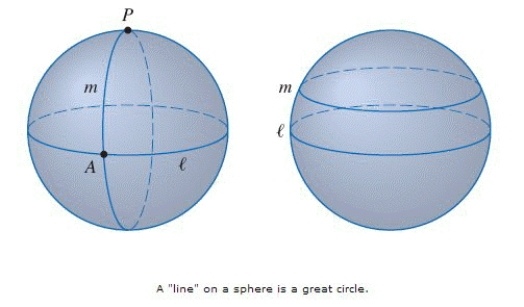
A) both are lines
B) l is a line (a great circle), but m is not
C) neither is a line

A) both are lines
B) l is a line (a great circle), but m is not
C) neither is a line

Unlock Deck
Unlock for access to all 139 flashcards in this deck.
Unlock Deck
k this deck
6
Associate the given name with one of the following geometries: Euclidean, hyperbolic, elliptic.
Nikolai Lobachevski
A) Euclidean
B) hyperbolic
C) elliptic
Nikolai Lobachevski
A) Euclidean
B) hyperbolic
C) elliptic

Unlock Deck
Unlock for access to all 139 flashcards in this deck.
Unlock Deck
k this deck
7
How closely does the ratio of the dimensions of a basketball court (36 ft by 78 ft) approximate τ?
A) 4.46
B) 2.11
C) 2.19
D) 2.23
E) 2.17
A) 4.46
B) 2.11
C) 2.19
D) 2.23
E) 2.17

Unlock Deck
Unlock for access to all 139 flashcards in this deck.
Unlock Deck
k this deck
8
If a window is to be 10 feet wide, how high should it be, to the nearest tenth of a foot, to be a golden rectangle? Assume that the width of the window is larger than height.
A) 6.2 feet
B) 8.3 feet
C) 6.9 feet
D) 4.9 feet
E) 12.4 feet
A) 6.2 feet
B) 8.3 feet
C) 6.9 feet
D) 4.9 feet
E) 12.4 feet

Unlock Deck
Unlock for access to all 139 flashcards in this deck.
Unlock Deck
k this deck
9
True or false?
In Lobachevskian geometry, the sum of the measures of the angles of a triangle is greater than 180 .
.
In Lobachevskian geometry, the sum of the measures of the angles of a triangle is greater than 180
 .
.
Unlock Deck
Unlock for access to all 139 flashcards in this deck.
Unlock Deck
k this deck
10
What is a golden ratio?
A) the number
B) the number
C) the number
D) the number
E) the number
A) the number

B) the number

C) the number

D) the number

E) the number


Unlock Deck
Unlock for access to all 139 flashcards in this deck.
Unlock Deck
k this deck
11
Write the ratio of length to width of a standard index card as a decimal.
A) 1.67
B) 1.74
C) 1.62
D) 1.60
E) 1.58
A) 1.67
B) 1.74
C) 1.62
D) 1.60
E) 1.58

Unlock Deck
Unlock for access to all 139 flashcards in this deck.
Unlock Deck
k this deck
12
Consider the spheres shown in the figure. The sphere at the left shows two lines. In Euclidean geometry, we know that two lines are either parallel or cross at exactly one point. Discuss this property in relation to what you observe in the figure. 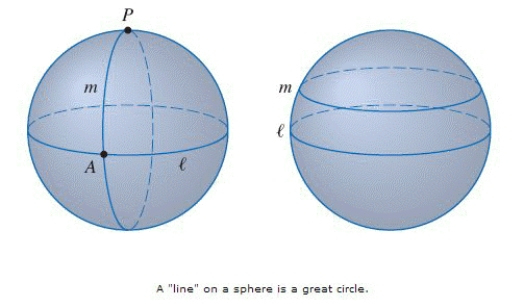
A) Two lines intersect in two points.
B) Two lines are either parallel or cross at exactly two points.
C) Lines are great circles, and m is not a great circle.

A) Two lines intersect in two points.
B) Two lines are either parallel or cross at exactly two points.
C) Lines are great circles, and m is not a great circle.

Unlock Deck
Unlock for access to all 139 flashcards in this deck.
Unlock Deck
k this deck
13
Name the geometry in which the statement is possible.
Was used to measure distances in the construction of the pyramids in ancient Egypt.
A) elliptic
B) Euclidean
C) hyperbolic
Was used to measure distances in the construction of the pyramids in ancient Egypt.
A) elliptic
B) Euclidean
C) hyperbolic

Unlock Deck
Unlock for access to all 139 flashcards in this deck.
Unlock Deck
k this deck
14
If a canvas for a painting is 8 inches wide, how high should it be, to the nearest inch, to be a rectangle with divine proportions? The canvas is higher than it is wide.
A) 26 inches
B) 13 inches
C) 12 inches
D) 11 inches
E) 5 inches
A) 26 inches
B) 13 inches
C) 12 inches
D) 11 inches
E) 5 inches

Unlock Deck
Unlock for access to all 139 flashcards in this deck.
Unlock Deck
k this deck
15
Leo Moser studied the effect that two face-to-face panes of glass have on light reflected through the panes. If a ray is not reflected, it has just one path through the glass. If it has one reflection, it can be reflected two ways. For two reflections, it can be reflected three ways. Make a conjecture about the number of paths for n reflections.
A) 1, 2, 3, 5, 7,....
B) 1, 2, 3, 4, 7,....
C) 1, 2, 3, 4, 5,....
D) 1, 2, 3, 5, 8,....
E) 1, 2, 3, 6, 12,....
A) 1, 2, 3, 5, 7,....
B) 1, 2, 3, 4, 7,....
C) 1, 2, 3, 4, 5,....
D) 1, 2, 3, 5, 8,....
E) 1, 2, 3, 6, 12,....

Unlock Deck
Unlock for access to all 139 flashcards in this deck.
Unlock Deck
k this deck
16
Name the geometry in which the statement is possible. The sum of the measures of the angles of a triangle is greater than 180  .
.
A) elliptic
B) hyperbolic
C) Euclidean
 .
.A) elliptic
B) hyperbolic
C) Euclidean

Unlock Deck
Unlock for access to all 139 flashcards in this deck.
Unlock Deck
k this deck
17
Is the figure Saccheri quadrilateral? 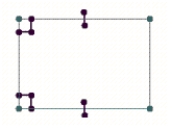
A) no
B) yes

A) no
B) yes

Unlock Deck
Unlock for access to all 139 flashcards in this deck.
Unlock Deck
k this deck
18
Find the angle  (to the nearest degree).
(to the nearest degree).
A)
B)
C)
D)
E)
 (to the nearest degree).
(to the nearest degree). A)

B)

C)

D)

E)


Unlock Deck
Unlock for access to all 139 flashcards in this deck.
Unlock Deck
k this deck
19
On a globe, locate Tokyo, Seattle, and Honolulu. Connect these cities with the shortest paths to form a triangle. Next, use a protractor to measure the angles. What is their sum?
A) less than 180°
B) greater than 180°
C) 180°
A) less than 180°
B) greater than 180°
C) 180°

Unlock Deck
Unlock for access to all 139 flashcards in this deck.
Unlock Deck
k this deck
20
A photograph is to be printed on a rectangle in the divine proportion. If it is 7 cm high, how wide is it, to the nearest centimeter ?
A) 23 cm
B) 10 cm
C) 16 cm
D) 13 cm
E) 11 cm
A) 23 cm
B) 10 cm
C) 16 cm
D) 13 cm
E) 11 cm

Unlock Deck
Unlock for access to all 139 flashcards in this deck.
Unlock Deck
k this deck
21
Consider the spheres shown in the figure.
The sphere at the left shows two lines. In Euclidean geometry, we know that two lines are either parallel or cross at exactly one point. Discuss this property in relation to what you observe in the figure.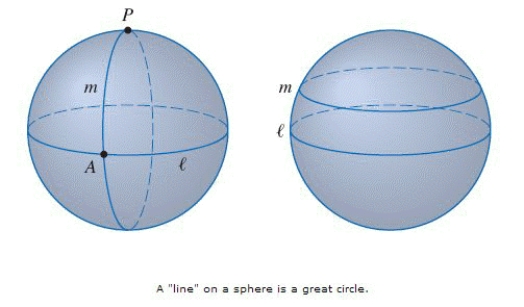
The sphere at the left shows two lines. In Euclidean geometry, we know that two lines are either parallel or cross at exactly one point. Discuss this property in relation to what you observe in the figure.


Unlock Deck
Unlock for access to all 139 flashcards in this deck.
Unlock Deck
k this deck
22
A plant grows for two months and then adds a new branch. Each new branch grows for two months, and then adds another branch. After the second month, each branch adds a new branch every month. Assume that the growth begins in January. How many branches will there be in June?
__________ branches
__________ branches

Unlock Deck
Unlock for access to all 139 flashcards in this deck.
Unlock Deck
k this deck
23
Associate the given name with one of the following geometries: Euclidean, hyperbolic, elliptic.
Nikolai Lobachevski
Nikolai Lobachevski

Unlock Deck
Unlock for access to all 139 flashcards in this deck.
Unlock Deck
k this deck
24
If a canvas for a painting is 19 inches wide, how high should it be, to the nearest inch, to be a rectangle with divine proportions? The canvas is higher than it is wide.
__________ in
__________ in

Unlock Deck
Unlock for access to all 139 flashcards in this deck.
Unlock Deck
k this deck
25
On a globe, locate Tokyo, Seattle, and Honolulu. Connect these cities with the shortest paths to form a triangle. Next, use a protractor to measure the angles. What is their sum?
Answer 180 degrees, less than 180 degrees, or greater than 180 degrees.
Answer 180 degrees, less than 180 degrees, or greater than 180 degrees.

Unlock Deck
Unlock for access to all 139 flashcards in this deck.
Unlock Deck
k this deck
26
Write the ratio of length to width of a standard brick as a decimal.

Unlock Deck
Unlock for access to all 139 flashcards in this deck.
Unlock Deck
k this deck
27
Name the geometry in which the statement is possible.
The base angles of a Saccheri quadrilateral are right angles.
The base angles of a Saccheri quadrilateral are right angles.

Unlock Deck
Unlock for access to all 139 flashcards in this deck.
Unlock Deck
k this deck
28
A photograph is to be printed on a rectangle in the divine proportion. If it is 8 cm high, how wide is it, to the nearest centimeter? Assume that the width of the rectangle is larger than the height.
__________ cm
__________ cm

Unlock Deck
Unlock for access to all 139 flashcards in this deck.
Unlock Deck
k this deck
29
Find the angle  (to the nearest degree).
(to the nearest degree).
__________°
 (to the nearest degree).
(to the nearest degree).
__________°

Unlock Deck
Unlock for access to all 139 flashcards in this deck.
Unlock Deck
k this deck
30
Answer true or false.
In Lobachevskian geometry, the sum of the measures of the angles of a triangle is greater than 180°.
In Lobachevskian geometry, the sum of the measures of the angles of a triangle is greater than 180°.

Unlock Deck
Unlock for access to all 139 flashcards in this deck.
Unlock Deck
k this deck
31
Name the geometry in which the statement is possible.
Was used to measure distances in the construction of the pyramids in ancient Egypt.
Was used to measure distances in the construction of the pyramids in ancient Egypt.

Unlock Deck
Unlock for access to all 139 flashcards in this deck.
Unlock Deck
k this deck
32
If a window is to be 7 feet wide, how high should it be, to the nearest tenth of a foot, to be a golden rectangle? Assume that the width of the window is larger than height.
__________ ft
__________ ft

Unlock Deck
Unlock for access to all 139 flashcards in this deck.
Unlock Deck
k this deck
33
Is the figure Saccheri quadrilateral? Answer yes or no. 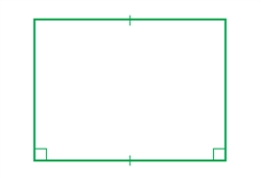


Unlock Deck
Unlock for access to all 139 flashcards in this deck.
Unlock Deck
k this deck
34
Write the ratio of length to width of a standard index card as a decimal. Express your answer to the nearest hundredth.

Unlock Deck
Unlock for access to all 139 flashcards in this deck.
Unlock Deck
k this deck
35
Walking north or south on the earth is defined as walking along the meridians, and walking east or west is defined as walking along parallels. There are points on the surface of the earth from which it is possible to walk a mile south, then a mile east, then a mile north, and be right back where you started. Find one such point.
Answer The North Pole, The South Pole, or A point on the Equator.
Answer The North Pole, The South Pole, or A point on the Equator.

Unlock Deck
Unlock for access to all 139 flashcards in this deck.
Unlock Deck
k this deck
36
What is τ?
A) The symbol used to denote the height of rectangle.
B) The symbol used to denote the golden ratio of rectangle.
C) The symbol used to denote the width of rectangle.
A) The symbol used to denote the height of rectangle.
B) The symbol used to denote the golden ratio of rectangle.
C) The symbol used to denote the width of rectangle.

Unlock Deck
Unlock for access to all 139 flashcards in this deck.
Unlock Deck
k this deck
37
Leo Moser studied the effect that two face-to-face panes of glass have on light reflected through the panes. If a ray is not reflected, it has just one path through the glass. If it has one reflection, it can be reflected two ways. For two reflections, it can be reflected three ways. How many possible paths are there for three reflections.
__________ paths
__________ paths

Unlock Deck
Unlock for access to all 139 flashcards in this deck.
Unlock Deck
k this deck
38
How closely does the ratio of the dimensions of a polo field (160 yd by 300 yd) approximate τ? Express your answer to the nearest thousandth.
Enter the absolute value of the difference between τ and the ratio.
Enter the absolute value of the difference between τ and the ratio.

Unlock Deck
Unlock for access to all 139 flashcards in this deck.
Unlock Deck
k this deck
39
Complete the sentence.
Euclid's treatment of the fifth axiom shows that ...
Euclid's treatment of the fifth axiom shows that ...

Unlock Deck
Unlock for access to all 139 flashcards in this deck.
Unlock Deck
k this deck
40
Consider the spheres shown in the figure.
Explain what is meant by a great circle on a sphere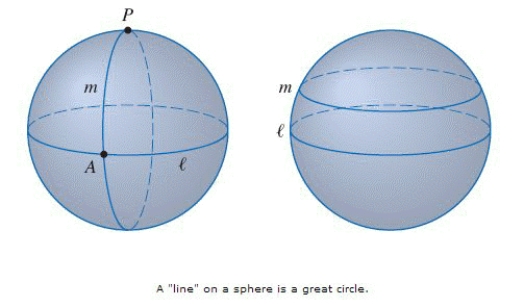 Answer A circle with diameter equal to that of the sphere or A circle with diameter equal to 1.
Answer A circle with diameter equal to that of the sphere or A circle with diameter equal to 1.
Explain what is meant by a great circle on a sphere
 Answer A circle with diameter equal to that of the sphere or A circle with diameter equal to 1.
Answer A circle with diameter equal to that of the sphere or A circle with diameter equal to 1.
Unlock Deck
Unlock for access to all 139 flashcards in this deck.
Unlock Deck
k this deck
41
A building's angle of elevation from a point on the ground 30 m from its base is 47°. Find the height of the building (to the nearest meter).
__________ m
__________ m

Unlock Deck
Unlock for access to all 139 flashcards in this deck.
Unlock Deck
k this deck
42
What is the side opposite ∠B? 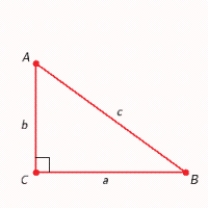
The side __________.

The side __________.

Unlock Deck
Unlock for access to all 139 flashcards in this deck.
Unlock Deck
k this deck
43
Tell whether it is possible to conclude that the triangles are similar. 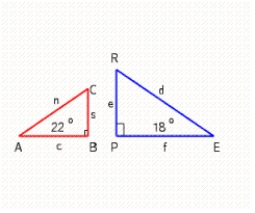
A) similar
B) not similar

A) similar
B) not similar

Unlock Deck
Unlock for access to all 139 flashcards in this deck.
Unlock Deck
k this deck
44
What is the width of the largest rectangle with length 24 in. you can cut from a circular piece of cardboard having a radius of 13 in.? (See the figure below.) 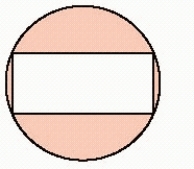
A) 12 in.
B) 14 in.
C) 6 in.
D) 10 in.
E) 5 in.

A) 12 in.
B) 14 in.
C) 6 in.
D) 10 in.
E) 5 in.

Unlock Deck
Unlock for access to all 139 flashcards in this deck.
Unlock Deck
k this deck
45
What is the radius of the largest circle you can cut from a rectangular poster board with measurements 39 in. by 40 in.?
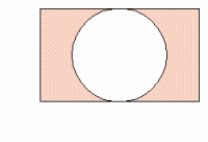
__________ in.

__________ in.

Unlock Deck
Unlock for access to all 139 flashcards in this deck.
Unlock Deck
k this deck
46
If the distance from the earth to the sun is  million miles, and the angle formed between Venus, the earth, and the sun is
million miles, and the angle formed between Venus, the earth, and the sun is  (as shown in the figure below), find the distance from the sun to Venus (to the nearest hundred thousand miles).
(as shown in the figure below), find the distance from the sun to Venus (to the nearest hundred thousand miles).
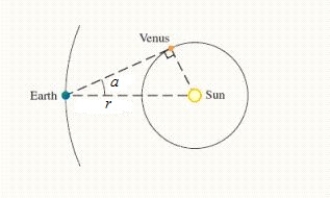
Where
__________ hundred thousand miles
 million miles, and the angle formed between Venus, the earth, and the sun is
million miles, and the angle formed between Venus, the earth, and the sun is  (as shown in the figure below), find the distance from the sun to Venus (to the nearest hundred thousand miles).
(as shown in the figure below), find the distance from the sun to Venus (to the nearest hundred thousand miles).

Where

__________ hundred thousand miles

Unlock Deck
Unlock for access to all 139 flashcards in this deck.
Unlock Deck
k this deck
47
From a police helicopter flying at 1,440 ft, a stolen car is sighted at an angle of depression of 58  . Find the distance of the car (to the nearest ft) from a point directly below the helicopter.
. Find the distance of the car (to the nearest ft) from a point directly below the helicopter.
A) 900 ft
B) 1,221 ft
C) 2,304 ft
D) 763 ft
E) 890 ft
 . Find the distance of the car (to the nearest ft) from a point directly below the helicopter.
. Find the distance of the car (to the nearest ft) from a point directly below the helicopter. A) 900 ft
B) 1,221 ft
C) 2,304 ft
D) 763 ft
E) 890 ft

Unlock Deck
Unlock for access to all 139 flashcards in this deck.
Unlock Deck
k this deck
48
Find the angle  by using either the table or a calculator. Round your answer to four decimal places.
by using either the table or a calculator. Round your answer to four decimal places.
A)
B)
C)
D)
E)
 by using either the table or a calculator. Round your answer to four decimal places.
by using either the table or a calculator. Round your answer to four decimal places. A)

B)

C)

D)

E)


Unlock Deck
Unlock for access to all 139 flashcards in this deck.
Unlock Deck
k this deck
49
Find the sine, cosine, and tangent for the angle A.
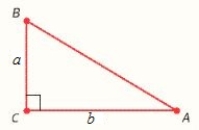
Where
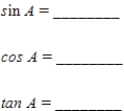

Where



Unlock Deck
Unlock for access to all 139 flashcards in this deck.
Unlock Deck
k this deck
50
Find the angle  by using either the table or a calculator.
by using either the table or a calculator.

 by using either the table or a calculator.
by using either the table or a calculator.


Unlock Deck
Unlock for access to all 139 flashcards in this deck.
Unlock Deck
k this deck
51
Find tan 69° by using either the table or a calculator. Round your answer to four decimal places, if required.



Unlock Deck
Unlock for access to all 139 flashcards in this deck.
Unlock Deck
k this deck
52
If the distance from the earth to the sun is  million miles, and the angle formed between Venus, the earth, and the sun is
million miles, and the angle formed between Venus, the earth, and the sun is  (as shown in the figure below), find the distance from the sun to Venus (to the nearest hundred thousand miles).
(as shown in the figure below), find the distance from the sun to Venus (to the nearest hundred thousand miles). 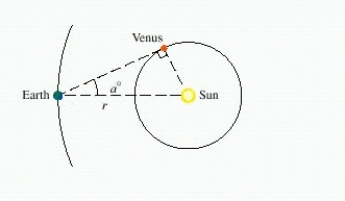
A) 66,300,000 miles
B) 66,500,000 miles
C) 66,400,000 miles
D) 132,500,000 miles
E) 66,100,000 miles
 million miles, and the angle formed between Venus, the earth, and the sun is
million miles, and the angle formed between Venus, the earth, and the sun is  (as shown in the figure below), find the distance from the sun to Venus (to the nearest hundred thousand miles).
(as shown in the figure below), find the distance from the sun to Venus (to the nearest hundred thousand miles). 
A) 66,300,000 miles
B) 66,500,000 miles
C) 66,400,000 miles
D) 132,500,000 miles
E) 66,100,000 miles

Unlock Deck
Unlock for access to all 139 flashcards in this deck.
Unlock Deck
k this deck
53
What is the radius of the largest circle you can cut from a rectangular poster board with measurements 39 in. by 42 in.? (See the figure below. ) 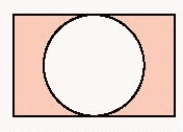
A) 39 in.
B) 19.5 in.
C) 21 in.
D) 18.5 in.
E) 42 in.

A) 39 in.
B) 19.5 in.
C) 21 in.
D) 18.5 in.
E) 42 in.

Unlock Deck
Unlock for access to all 139 flashcards in this deck.
Unlock Deck
k this deck
54
What is tan B?
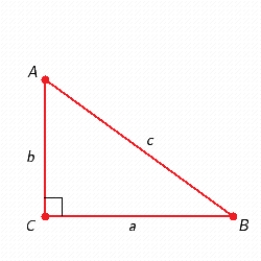


Unlock Deck
Unlock for access to all 139 flashcards in this deck.
Unlock Deck
k this deck
55
From a police helicopter flying at 1,107 ft, a stolen car is sighted at an angle of depression of 68°. Find the distance of the car (to the nearest ft) from a point directly below the helicopter.
__________ ft
__________ ft

Unlock Deck
Unlock for access to all 139 flashcards in this deck.
Unlock Deck
k this deck
56
What is sin B? 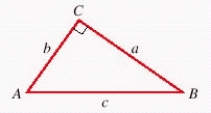
A)
B)
C)
D)
E)

A)

B)

C)

D)

E)


Unlock Deck
Unlock for access to all 139 flashcards in this deck.
Unlock Deck
k this deck
57
What is the width of the largest rectangle with length 16 in. you can cut from a circular piece of cardboard having a radius of 10 in.?
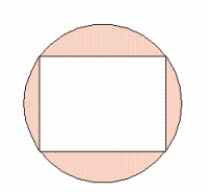
__________ in.

__________ in.

Unlock Deck
Unlock for access to all 139 flashcards in this deck.
Unlock Deck
k this deck
58
Find sin 53° by using either the table or a calculator. Round your answer to four decimal places.
A) 0.7984
B) 0.7986
C) 0.8136
D) 0.8009
E) 0.7997
A) 0.7984
B) 0.7986
C) 0.8136
D) 0.8009
E) 0.7997

Unlock Deck
Unlock for access to all 139 flashcards in this deck.
Unlock Deck
k this deck
59
A building's angle of elevation from a point on the ground 34 m from its base is 31°. Find the height of the building (to the nearest meter).
A) 8 m
B) 20 m
C) 29 m
D) 57 m
E) 18 m
A) 8 m
B) 20 m
C) 29 m
D) 57 m
E) 18 m

Unlock Deck
Unlock for access to all 139 flashcards in this deck.
Unlock Deck
k this deck
60
What is the side opposite 
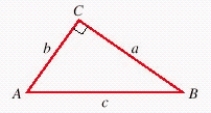
A) b
B) a
C) c


A) b
B) a
C) c

Unlock Deck
Unlock for access to all 139 flashcards in this deck.
Unlock Deck
k this deck
61
Are the triangles similar or not similar?
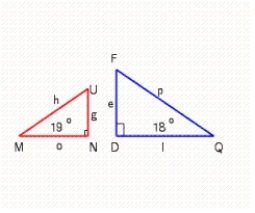


Unlock Deck
Unlock for access to all 139 flashcards in this deck.
Unlock Deck
k this deck
62
If a tree casts a shadow of 11 ft at the same time that a 6-ft person casts a shadow of 2 ft, find the height of the tree (to the nearest foot).
A) 33 ft
B) 6 ft
C) 2 ft
D) 17 ft
E) 11 ft
A) 33 ft
B) 6 ft
C) 2 ft
D) 17 ft
E) 11 ft

Unlock Deck
Unlock for access to all 139 flashcards in this deck.
Unlock Deck
k this deck
63
The figure contains two similar triangles. Find the unknown measure indicated by a variable. Round your answer to the nearest tenth. 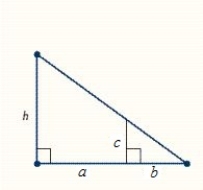
Where
A)
B)
C)
D) 
E) 

Where

A)

B)

C)

D)

E)


Unlock Deck
Unlock for access to all 139 flashcards in this deck.
Unlock Deck
k this deck
64
Given two similar triangles, find b1.

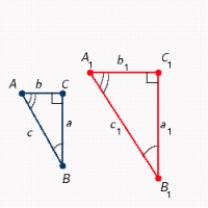





Unlock Deck
Unlock for access to all 139 flashcards in this deck.
Unlock Deck
k this deck
65
The figure contains two similar triangles. Find the unknown measure indicated by a variable. Round your answer to the nearest tenth.
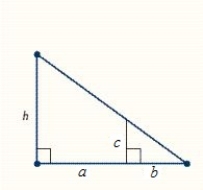
Where


Where



Unlock Deck
Unlock for access to all 139 flashcards in this deck.
Unlock Deck
k this deck
66
Given two similar triangles, as shown in the figure, find b1. 
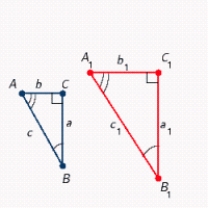
A)
B)
C)
D)
E)


A)

B)

C)

D)

E)


Unlock Deck
Unlock for access to all 139 flashcards in this deck.
Unlock Deck
k this deck
67
If a tree casts a shadow of 5 ft 7 in. at the same time that a 5-ft 7-in. person casts a shadow of 1 ft 6 in., find the height of the tree (to the nearest inch).
__________ ft __________ in
__________ ft __________ in

Unlock Deck
Unlock for access to all 139 flashcards in this deck.
Unlock Deck
k this deck
68
Suppose a 6-ft person wishes to determine the height of a bridge above the bottom of a canyon, as shown in the figure below. To do this, this person stands at one end of the bridge (point A) and looks down to a point directly below the other end (point B). With the help of a companion, point P is determined to form two triangles. Find the distance to the bottom of the canyon, if  ft and
ft and  ft.
ft. 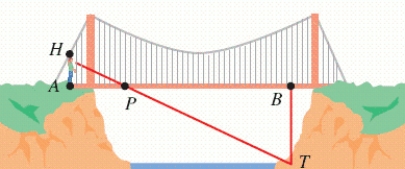
A) 30 ft
B) 8 ft
C) 5 ft
D) 6 ft
E) 40 ft
 ft and
ft and  ft.
ft. 
A) 30 ft
B) 8 ft
C) 5 ft
D) 6 ft
E) 40 ft

Unlock Deck
Unlock for access to all 139 flashcards in this deck.
Unlock Deck
k this deck
69
If a tree casts a shadow of 5 ft 8 in. at the same time that a 6-ft 11-in. person casts a shadow of 4 ft 2 in., find the height of the tree (to the nearest inch).
A) 8 ft 4 in.
B) 11 ft 6 in.
C) 9 ft
D) 9 ft 5 in.
E) 9 ft 4 in.
A) 8 ft 4 in.
B) 11 ft 6 in.
C) 9 ft
D) 9 ft 5 in.
E) 9 ft 4 in.

Unlock Deck
Unlock for access to all 139 flashcards in this deck.
Unlock Deck
k this deck
70
List all six angles for the figures given in problem. 
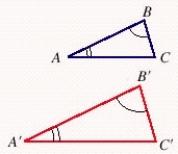
A) 
B) 
C) 
D) 
E) 


A)

B)

C)

D)

E)


Unlock Deck
Unlock for access to all 139 flashcards in this deck.
Unlock Deck
k this deck
71
List the lengths of all six sides for the figures given in the problem. 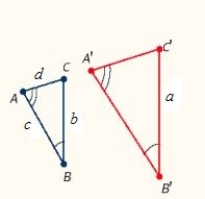
Where
A)
B)
C)
D)
E) none of these choices

Where

A)

B)

C)

D)

E) none of these choices

Unlock Deck
Unlock for access to all 139 flashcards in this deck.
Unlock Deck
k this deck
72
Use similar triangles and a proportion to find the height of the house shown in the figure.
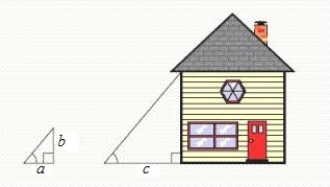
Where
__________ ft

Where

__________ ft

Unlock Deck
Unlock for access to all 139 flashcards in this deck.
Unlock Deck
k this deck
73
Find the unknown angles for the figures.
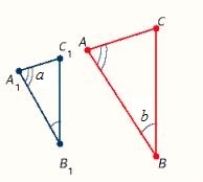
Where
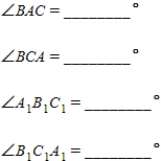

Where



Unlock Deck
Unlock for access to all 139 flashcards in this deck.
Unlock Deck
k this deck
74
List the lengths of the unknown sides for the figures.
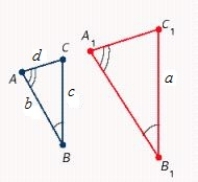
Where


Where



Unlock Deck
Unlock for access to all 139 flashcards in this deck.
Unlock Deck
k this deck
75
Use similar triangles and a proportion to find the height of the house shown in the figure below. 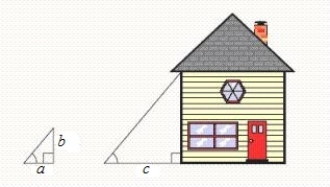
Where
A) 16 ft
B) 20 ft
C) 18 ft
D) 72 ft
E) 4 ft

Where

A) 16 ft
B) 20 ft
C) 18 ft
D) 72 ft
E) 4 ft

Unlock Deck
Unlock for access to all 139 flashcards in this deck.
Unlock Deck
k this deck
76
Given  is perpendicular to
is perpendicular to  , and
, and  is an equilateral triangle. Is
is an equilateral triangle. Is  similar to
similar to  ?
? 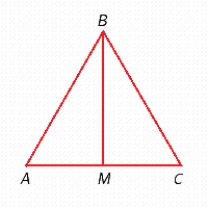
A) Yes
B) No
 is perpendicular to
is perpendicular to  , and
, and  is an equilateral triangle. Is
is an equilateral triangle. Is  similar to
similar to  ?
? 
A) Yes
B) No

Unlock Deck
Unlock for access to all 139 flashcards in this deck.
Unlock Deck
k this deck
77
Suppose a 6-ft person wishes to determine the height of a bridge above the bottom of a canyon, as shown in the figure below. To do this, this person stands at one end of the bridge (point A) and looks down to a point directly below the other end (point B). With the help of a companion, point P is determined to form two triangles. Find the distance to the bottom of the canyon, if  ft and
ft and  ft.
ft.
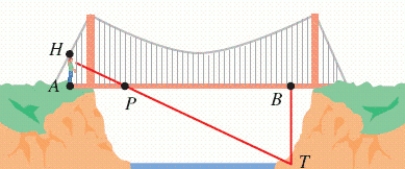
__________ ft
 ft and
ft and  ft.
ft.

__________ ft

Unlock Deck
Unlock for access to all 139 flashcards in this deck.
Unlock Deck
k this deck
78
If a tree casts a shadow of 11 ft at the same time that a 6-ft person casts a shadow of 1 ft, find the height of the tree (to the nearest foot).
__________ ft
__________ ft

Unlock Deck
Unlock for access to all 139 flashcards in this deck.
Unlock Deck
k this deck
79
Suppose a 6-ft person wishes to determine the height of a footbridge connecting two buildings, as shown in the figure below. To do this, this person stands at one end of the bridge (point S) and looks down to a point directly below the other end (point T). With the help of a companion, point P is determined to form two triangles. Find the height of the footbridge, if  ft and
ft and  ft.
ft. 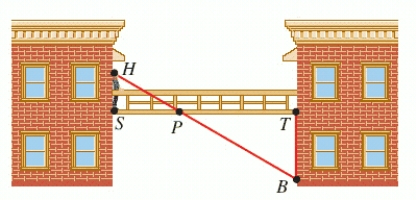
A) 9 ft
B) 6 ft
C) 72 ft
D) 8 ft
E) 48 ft
 ft and
ft and  ft.
ft. 
A) 9 ft
B) 6 ft
C) 72 ft
D) 8 ft
E) 48 ft

Unlock Deck
Unlock for access to all 139 flashcards in this deck.
Unlock Deck
k this deck
80
Suppose a 5-ft person wishes to determine the height of a footbridge connecting two buildings, as shown in the figure below. To do this, this person stands at one end of the bridge (point S) and looks down to a point directly below the other end (point T). With the help of a companion, point P is determined to form two triangles. Find the height of the footbridge, if  ft and
ft and  ft.
ft.
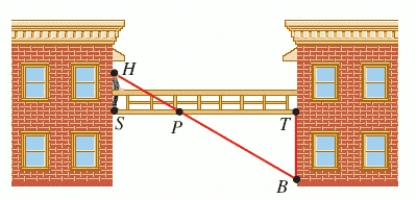
__________ ft
 ft and
ft and  ft.
ft.

__________ ft

Unlock Deck
Unlock for access to all 139 flashcards in this deck.
Unlock Deck
k this deck


